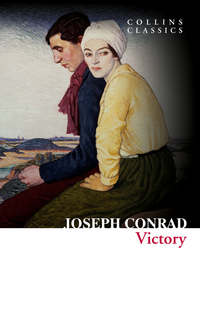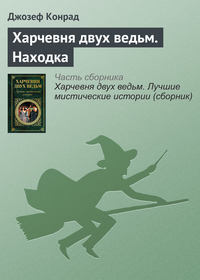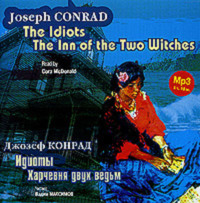
"Did you hear him?" she said. "Did you hear him, Mr. Churchill. He casts off – he disowns me. Isn't he a stern brother? And the quarrel is about nothing." The impudence – or the presence of mind of it – overwhelmed me.
Churchill smiled pleasantly.
"Oh – one always quarrels about nothing," Churchill answered. He spoke a few words to her; about my aunt; about the way her machine ran – that sort of thing. He behaved toward her as if she were an indulged child, impertinent with licence and welcome enough. He himself looked rather like the short-sighted, but indulgent and very meagre lion that peers at the unicorn across a plum-cake.
"So you are going back to Paris," he said. "Miss Churchill will be sorry. And you are going to continue to – to break up the universe?"
"Oh, yes," she answered, "we are going on with that, my aunt would never give it up. She couldn't, you know."
"You'll get into trouble," Churchill said, as if he were talking to a child intent on stealing apples. "And when is our turn coming? You're going to restore the Stuarts, aren't you?" It was his idea of badinage, amiable without consequence.
"Oh, not quite that," she answered, "not quite that." It was curious to watch her talking to another man – to a man, not a bagman like Callan. She put aside the face she always showed me and became at once what Churchill took her for – a spoiled child. At times she suggested a certain kind of American, and had that indefinable air of glib acquaintance with the names, and none of the spirit of tradition. One half expected her to utter rhapsodies about donjon-keeps.
"Oh, you know," she said, with a fine affectation of aloofness, "we shall have to be rather hard upon you; we shall crumple you up like – " Churchill had been moving his stick absent-mindedly in the dust of the road, he had produced a big "C H U." She had erased it with the point of her foot – "like that," she concluded.
He laid his head back and laughed almost heartily.
"Dear me," he said, "I had no idea that I was so much in the way of – of yourself and Mrs. Granger."
"Oh, it's not only that," she said, with a little smile and a cast of the eye to me. "But you've got to make way for the future."
Churchill's face changed suddenly. He looked rather old, and grey, and wintry, even a little frail. I understood what she was proving to me, and I rather disliked her for it. It seemed wantonly cruel to remind a man of what he was trying to forget.
"Ah, yes," he said, with the gentle sadness of quite an old man, "I dare say there is more in that than you think. Even you will have to learn."
"But not for a long time," she interrupted audaciously.
"I hope not," he answered, "I hope not." She nodded and glided away.
We resumed the road in silence. Mr. Churchill smiled at his own thoughts once or twice.
"A most amusing …" he said at last. "She does me a great deal of good, a great deal."
I think he meant that she distracted his thoughts.
"Does she always talk like that?" I asked. He had hardly spoken to me, and I felt as if I were interrupting a reverie – but I wanted to know.
"I should say she did," he answered; "I should say so. But Miss Churchill says that she has a real genius for organization. She used to see a good deal of them, before they went to Paris, you know."
"What are they doing there?" It was as if I were extracting secrets from a sleep-walker.
"Oh, they have a kind of a meeting place, for all kinds of Legitimist pretenders – French and Spanish, and that sort of thing. I believe Mrs. Granger takes it very seriously." He looked at me suddenly. "But you ought to know more about it than I do," he said.
"Oh, we see very little of each other," I answered, "you could hardly call us brother and sister."
"Oh, I see," he answered. I don't know what he saw. For myself, I saw nothing.
CHAPTER SEVEN
I succeeded in giving Fox what his journal wanted; I got the atmosphere of Churchill and his house, in a way that satisfied the people for whom it was meant. His house was a pleasant enough place, of the sort where they do you well, but not nauseously well. It stood in a tranquil countryside, and stood there modestly. Architecturally speaking, it was gently commonplace; one got used to it and liked it. And Churchill himself, when one had become accustomed to his manner, one liked very well – very well indeed. He had a dainty, dilettante mind, delicately balanced, with strong limitations, a fantastic temperament for a person in his walk of life – but sane, mind you, persistent. After a time, I amused myself with a theory that his heart was not in his work, that circumstance had driven him into the career of politics and ironical fate set him at its head. For myself, I had an intense contempt for the political mind, and it struck me that he had some of the same feeling. He had little personal quaintnesses, too, a deference, a modesty, an open-mindedness.
I was with him for the greater part of his weekend holiday; hung, perforce, about him whenever he had any leisure. I suppose he found me tiresome – but one has to do these things. He talked, and I talked; heavens, how we talked! He was almost always deferential, I almost always dogmatic; perhaps because the conversation kept on my own ground. Politics we never touched. I seemed to feel that if I broached them, I should be checked – politely, but very definitely. Perhaps he actually contrived to convey as much to me; perhaps I evolved the idea that if I were to say:
"What do you think about the 'Greenland System'" – he would answer:
"I try not to think about it," or whatever gently closuring phrase his mind conceived. But I never did so; there were so many other topics.
He was then writing his Life of Cromwell and his mind was very full of his subject. Once he opened his heart, after delicately sounding me for signs of boredom. It happened, by the merest chance – one of those blind chances that inevitably lead in the future – that I, too, was obsessed at that moment by the Lord Oliver. A great many years before, when I was a yearling of tremendous plans, I had set about one of those glorious novels that one plans – a splendid thing with Old Noll as the hero or the heavy father. I had haunted the bookstalls in search of local colour and had wonderfully well invested my half-crowns. Thus a company of seventeenth century tracts, dog-eared, coverless, but very glorious under their dust, accompany me through life. One parts last with those relics of a golden age, and during my late convalescence I had reread many of them, the arbitrary half-remembered phrases suggesting all sorts of scenes – lamplight in squalid streets, trays full of weather-beaten books. So, even then, my mind was full of Mercurius Rusticus. Mr. Churchill on Cromwell amused me immensely and even excited me. It was life, this attending at a self-revelation of an impossible temperament. It did me good, as he had said of my pseudo-sister. It was fantastic – as fantastic as herself – and it came out more in his conversation than in the book itself. I had something to do with that, of course. But imagine the treatment accorded to Cromwell by this delicate, negative, obstinately judicial personality. It was the sort of thing one wants to get into a novel. It was a lesson to me – in temperament, in point of view; I went with his mood, tried even to outdo him, in the hope of spurring him to outdo himself. I only mention it because I did it so well that it led to extraordinary consequences.
We were walking up and down his lawn, in the twilight, after his Sunday supper. The pale light shone along the gleaming laurels and dwelt upon the soft clouds of orchard blossoms that shimmered above them. It dwelt, too, upon the silver streaks in his dark hair and made his face seem more pallid, and more old. It affected me like some intense piece of irony. It was like hearing a dying man talk of the year after next. I had the sense of the unreality of things strong upon me. Why should nightingale upon nightingale pour out volley upon volley of song for the delight of a politician whose heart was not in his task of keeping back the waters of the deluge, but who grew animated at the idea of damning one of the titans who had let loose the deluge?
About a week after – or it may have been a fortnight – Churchill wrote to me and asked me to take him to see the Jenkins of my Jenkins story. It was one of those ordeals that one goes through when one has tried to advance one's friends. Jenkins took the matter amiss, thought it was a display of insulting patronage on the part of officialism. He was reluctant to show his best work, the forgotten masterpieces, the things that had never sold, that hung about on the faded walls and rotted in cellars. He would not be his genial self; he would not talk. Churchill behaved very well – I think he understood.
Jenkins thawed before his gentle appreciations. I could see the change operating within him. He began to realise that this incredible visit from a man who ought to be hand and glove with Academicians was something other than a spy's encroachment. He was old, you must remember, and entirely unsuccessful. He had fought a hard fight and had been worsted. He took his revenge in these suspicions.
We younger men adored him. He had the ruddy face and the archaic silver hair of the King of Hearts; and a wonderful elaborate politeness that he had inherited from his youth – from the days of Brummell. And, whilst all his belongings were rotting into dust, he retained an extraordinarily youthful and ingenuous habit of mind. It was that, or a little of it, that gave the charm to my Jenkins story.
It was a disagreeable experience. I wished so much that the perennial hopefulness of the man should at last escape deferring and I was afraid that Churchill would chill before Jenkins had time to thaw. But, as I have said, I think Churchill understood. He smiled his kindly, short-sighted smile over canvas after canvas, praised the right thing in each, remembered having seen this and that in such and such a year, and Jenkins thawed.
He happened to leave the room – to fetch some studies, to hurry up the tea or for some such reason. Bereft of his presence the place suddenly grew ghostly. It was as if the sun had died in the sky and left us in that nether world where dead, buried pasts live in a grey, shadowless light. Jenkins' palette glowed from above a medley of stained rags on his open colour table. The rush-bottom of his chair resembled a wind-torn thatch.
"One can draw morals from a life like that," I said suddenly. I was thinking rather of Jenkins than of the man I was talking to.
"Why, yes," he said, absently, "I suppose there are men who haven't the knack of getting on."
"It's more than a knack," I said, with unnecessary bitterness. "It's a temperament."
"I think it's a habit, too. It may be acquired, mayn't it?"
"No, no," I fulminated, "it's precisely because it can't be acquired that the best men – the men like …" I stopped suddenly, impressed by the idea that the thing was out of tone. I had to assert myself more than I liked in talking to Churchill. Otherwise I should have disappeared. A word from him had the weight of three kingdoms and several colonies behind it, and I was forced to get that out of my head by making conversation a mere matter of temperament. In that I was the stronger. If I wanted to say a thing, I said it; but he was hampered by a judicial mind. It seemed, too, that he liked a dictatorial interlocutor, else he would hardly have brought himself into contact with me again. Perhaps it was new to him. My eye fell upon a couple of masks, hanging one on each side of the fireplace. The room was full of a profusion of little casts, thick with dust upon the shoulders, the hair, the eyelids, on every part that projected outward.
"By-the-bye," I said, "that's a death-mask of Cromwell."
"Ah!" he answered, "I knew there was…"
He moved very slowly toward it, rather as if he did not wish to bring it within his field of view. He stopped before reaching it and pivotted slowly to face me.
"About my book," he opened suddenly, "I have so little time." His briskness dropped into a half complaint, like a faintly suggested avowal of impotence. "I have been at it four years now. It struck me – you seemed to coincide so singularly with my ideas."
His speech came wavering to a close, but he recommenced it apologetically – as if he wished me to help him out.
"I went to see Smithson the publisher about it, and he said he had no objection…"
He looked appealingly at me. I kept silence.
"Of course, it's not your sort of work. But you might try… You see…" He came to a sustained halt.
"I don't understand," I said, rather coldly, when the silence became embarrassing. "You want me to 'ghost' for you?"
"'Ghost,' good gracious no," he said, energetically; "dear me, no!"
"Then I really don't understand," I said.
"I thought you might see your … I wanted you to collaborate with me.
Quite publicly, of course, as far as the epithet applies."
"To collaborate," I said slowly. "You…"
I was looking at a miniature of the Farnese Hercules – I wondered what it meant, what club had struck the wheel of my fortune and whirled it into this astounding attitude.
"Of course you must think about it," he said.
"I don't know," I muttered; "the idea is so new. It's so little in my line. I don't know what I should make of it."
I talked at random. There were so many thoughts jostling in my head. It seemed to carry me so much farther from the kind of work I wanted to do. I did not really doubt my ability – one does not. I rather regarded it as work upon a lower plane. And it was a tremendous – an incredibly tremendous – opportunity.
"You know pretty well how much I've done," he continued. "I've got a good deal of material together and a good deal of the actual writing is done. But there is ever so much still to do. It's getting beyond me, as I said just now."
I looked at him again, rather incredulously. He stood before me, a thin parallelogram of black with a mosaic of white about the throat. The slight grotesqueness of the man made him almost impossibly real in his abstracted earnestness. He so much meant what he said that he ignored what his hands were doing, or his body or his head. He had taken a very small, very dusty book out of a little shelf beside him, and was absently turning over the rusty leaves, while he talked with his head bent over it. What was I to him, or he to me?
"I could give my Saturday afternoons to it," he was saying, "whenever you could come down."
"It's immensely kind of you," I began.
"Not at all, not at all," he waived. "I've set my heart on doing it and, unless you help me, I don't suppose I ever shall get it done."
"But there are hundreds of others," I said.
"There may be," he said, "there may be. But I have not come across them."
I was beset by a sudden emotion of blind candour.
"Oh, nonsense, nonsense," I said. "Don't you see that you are offering me the chance of a lifetime?"
Churchill laughed.
"After all, one cannot refuse to take what offers," he said. "Besides, your right man to do the work might not suit me as a collaborator."
"It's very tempting," I said.
"Why, then, succumb," he smiled.
I could not find arguments against him, and I succumbed as Jenkins re-entered the room.
CHAPTER EIGHT
After that I began to live, as one lives; and for forty-nine weeks. I know it was forty-nine, because I got fifty-two atmospheres in all; Callan's and Churchill's, and those forty-nine and the last one that finished the job and the year of it. It was amusing work in its way; people mostly preferred to have their atmospheres taken at their country houses – it showed that they had them, I suppose. Thus I spent a couple of days out of every week in agreeable resorts, and people were very nice to me – it was part of the game.
So I had a pretty good time for a year and enjoyed it, probably because I had had a pretty bad one for several years. I filled in the rest of my weeks by helping Fox and collaborating with Mr. Churchill and adoring Mrs. Hartly at odd moments. I used to hang about the office of the Hour on the chance of snapping up a blank three lines fit for a subtle puff of her. Sometimes they were too hurried to be subtle, and then Mrs. Hartly was really pleased.
I never understood her in the least, and I very much doubt whether she ever understood a word I said. I imagine that I must have talked to her about her art or her mission – things obviously as strange to her as to the excellent Hartly himself. I suppose she hadn't any art; I am certain she hadn't any mission, except to be adored. She walked about the stage and one adored her, just as she sat about her flat and was adored, and there the matter ended.
As for Fox, I seemed to suit him – I don't in the least know why. No doubt he knew me better than I knew myself. He used to get hold of me whilst I was hanging about the office on the chance of engaging space for Mrs. Hartly, and he used to utilise me for the ignoblest things. I saw men for him, scribbled notes for him, abused people through the telephone, and wrote articles. Of course, there were the pickings.
I never understood Fox – not in the least, not more than I understood Mrs. Hartly. He had the mannerisms of the most incredible vulgarian and had, apparently, the point of view of a pig. But there was something else that obscured all that, that forced one to call him a wonderful man. Everyone called him that. He used to say that he knew what he wanted and that he got it, and that was true, too. I didn't in the least want to do his odd jobs, even for the ensuing pickings, and I didn't want to be hail-fellow with him. But I did them and I was, without even realising that it was distasteful to me. It was probably the same with everybody else.
I used to have an idea that I was going to reform him; that one day I should make him convert the Hour into an asylum for writers of merit. He used to let me have my own way sometimes – just often enough to keep my conscience from inconveniencing me. He let me present Lea with an occasional column and a half; and once he promised me that one day he would allow me to get the atmosphere of Arthur Edwards, the novelist.
Then there was Churchill and the Life of Cromwell that progressed slowly. The experiment succeeded well enough, as I grew less domineering and he less embarrassed. Toward the end I seemed to have become a familiar inmate of his house. I used to go down with him on Saturday afternoons and we talked things over in the train. It was, to an idler like myself, wonderful the way that essential idler's days were cut out and fitted in like the squares of a child's puzzle; little passages of work of one kind fitting into quite unrelated passages of something else. He did it well, too, without the remotest semblance of hurry.
I suppose that actually the motive power was his aunt. People used to say so, but it did not appear on the surface to anyone in close contact with the man; or it appeared only in very small things. We used to work in a tall, dark, pleasant room, book-lined, and giving on to a lawn that was always an asylum for furtive thrushes. Miss Churchill, as a rule, sat half forgotten near the window, with the light falling over her shoulder. She was always very absorbed in papers; seemed to be spending laborious days in answering letters, in evolving reports. Occasionally she addressed a question to her nephew, occasionally received guests that came informally but could not be refused admittance. Once it was a semi-royal personage, once the Duc de Mersch, my reputed employer.
The latter, I remember, was announced when Churchill and I were finally finishing our account of the tremendous passing of the Protector. In that silent room I had a vivid sense of the vast noise of the storm in that twilight of the crowning mercy. I seemed to see the candles a-flicker in the eddies of air forced into the gloomy room; the great bed and the portentous uncouth form that struggled in the shadows of the hangings. Miss Churchill looked up from the card that had been placed in her hands.
"Edward," she said, "the Duc de Mersch."
Churchill rose irritably from his low seat. "Confound him," he said, "I won't see him."
"You can't help it, I think," his aunt said, reflectively; "you will have to settle it sooner or later."
I know pretty well what it was they had to settle – the Greenland affair that had hung in the air so long. I knew it from hearsay, from Fox, vaguely enough. Mr. Gurnard was said to recommend it for financial reasons, the Duc to be eager, Churchill to hang back unaccountably. I never had much head for details of this sort, but people used to explain them to me – to explain the reasons for de Mersch's eagerness. They were rather shabby, rather incredible reasons, that sounded too reasonable to be true. He wanted the money for his railways – wanted it very badly. He was vastly in want of money, he was this, that, and the other in certain international-philanthropic concerns, and had a finger in this, that, and the other pie. There was an "All Round the World Cable Company" that united hearts and hands, and a "Pan-European Railway, Exploration, and Civilisation Company" that let in light in dark places, and an "International Housing of the Poor Company," as well as a number of others. Somewhere at the bottom of these seemingly bottomless concerns, the Duc de Mersch was said to be moving, and the Hour certainly contained periodically complimentary allusions to their higher philanthropy and dividend-earning prospects. But that was as much as I knew. The same people – people one met in smoking-rooms – said that the Trans-Greenland Railway was the last card of de Mersch. British investors wouldn't trust the Duc without some sort of guarantee from the British Government, and no other investor would trust him on any terms. England was to guarantee something or other – the interest for a number of years, I suppose. I didn't believe them, of course – one makes it a practice to believe nothing of the sort. But I recognised that the evening was momentous to somebody – that Mr. Gurnard and the Duc de Mersch and Churchill were to discuss something and that I was remotely interested because the Hour employed me.
Churchill continued to pace up and down.
"Gurnard dines here to-night," his aunt said.
"Oh, I see." His hands played with some coins in his trouser-pockets. "I see," he said again, "they've …"
The occasion impressed me. I remember very well the manner of both nephew and aunt. They seemed to be suddenly called to come to a decision that was no easy one, that they had wished to relegate to an indefinite future.
She left Churchill pacing nervously up and down.
"I could go on with something else, if you like," I said.
"But I don't like," he said, energetically; "I'd much rather not see the man. You know the sort of person he is."
"Why, no," I answered, "I never studied the Almanac de Gotha."
"Oh, I forgot," he said. He seemed vexed with himself.
Churchill's dinners were frequently rather trying to me. Personages of enormous importance used to drop in – and reveal themselves as rather asinine. At the best of times they sat dimly opposite to me, discomposed me, and disappeared. Sometimes they stared me down. That night there were two of them.
Gurnard I had heard of. One can't help hearing of a Chancellor of the Exchequer. The books of reference said that he was the son of one William Gurnard, Esq., of Grimsby; but I remember that once in my club a man who professed to know everything, assured me that W. Gurnard, Esq. (whom he had described as a fish salesman), was only an adoptive father. His rapid rise seemed to me inexplicable till the same man accounted for it with a shrug: "When a man of such ability believes in nothing, and sticks at nothing, there's no saying how far he may go. He has kicked away every ladder. He doesn't mean to come down."
This, no doubt, explained much; but not everything in his fabulous career. His adherents called him an inspired statesman; his enemies set him down a mere politician. He was a man of forty-five, thin, slightly bald, and with an icy assurance of manner. He was indifferent to attacks upon his character, but crushed mercilessly every one who menaced his position. He stood alone, and a little mysterious; his own party was afraid of him.








